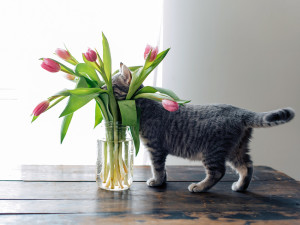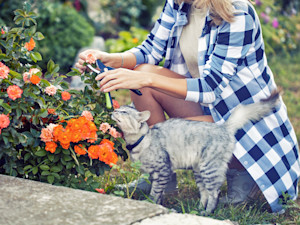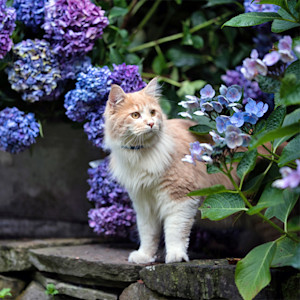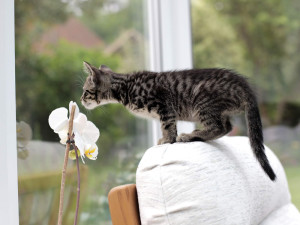Are Roses Toxic to Cats?
They sure do like sniffing around those bouquets...
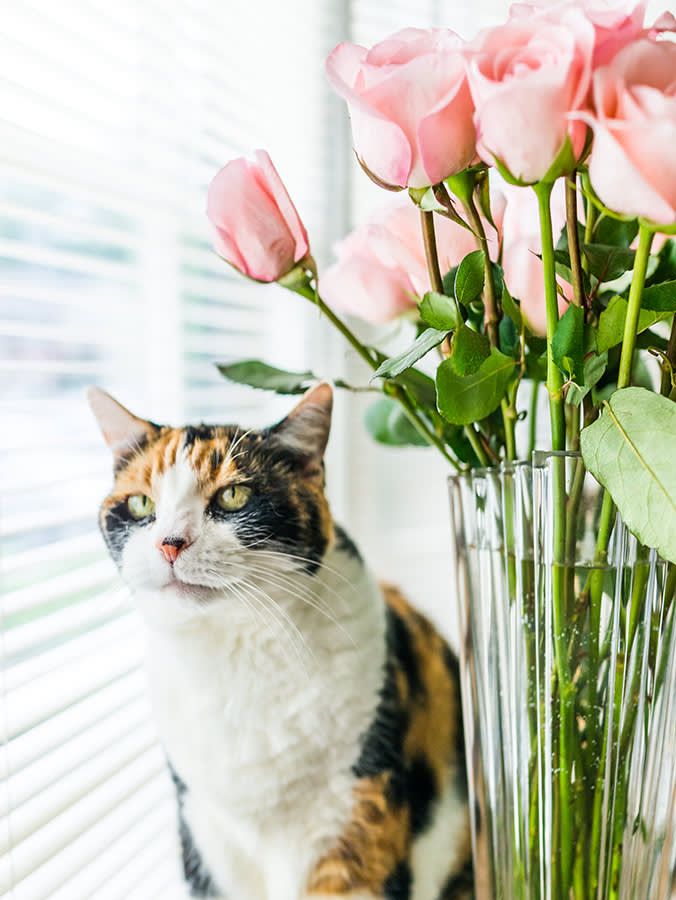
Share Article
We all love the beauty and fragrance of roses, but if you’re a cat parent, you might be wondering whether these lovely blooms are safe for your curious kitty. The good news is, roses (Rosa genus) aren’t considered toxic to cats, but there are a few potential hazards you should be aware of.
From mild tummy troubles to those pesky thorns, let’s explore how to keep your cat safe and sound around your favorite flowers. Plus, we’ve got tips on what to do if your cat decides to have a nibble and a list of other pet-friendly plants you can add to your home without worry. Let’s dive in.
Are roses dangerous for cats?
Roses can cause mild issues if eaten or interacted with but are not considered toxic to cats. There are a couple of possible dangers to having roses around your feline friends, but these can be avoided with some simple precautions and watchfulness.
Rose leaves and petals
Cats aren’t used to eating much plant material, so ingesting rose petals could upset their stomach, despite not containing any toxins. This may result in an episode or two of vomiting that contains chewed bits of rose but should not make the cat feel sick for any significant amount of time.

Rose thorns
Unless de-thorned, roses contain sharp prickles that pose a hazard to any creature looking for a snack, including curious cats. Kitties will often grab their “prey” with their paws before chomping down, and this could lead to wounds on their paws. Cats who enjoy rubbing their faces on everything in their domain run the risk of getting scratched as well.
Pesticides
Pesticides can pose serious risks to cats, especially if they eat plants treated with these chemicals. When cats munch on roses or other plants, they can ingest harmful substances like insecticides, herbicides, and fungicides. These chemicals are designed to kill pests, but they can also cause harm to your cat.
Symptoms of pesticide poisoning in cats can include excessive drooling, vomiting, diarrhea, seizures, respiratory distress, and even coma or death.
What should I do if my cat has eaten a rose?
The best way to deal with your cat eating a rose is to move any remaining roses out of their reach. Although roses aren’t toxic, cats shouldn’t be allowed to gorge themselves on them. Plus, who wants their beautiful roses chewed to bits? Below are some more red flags to look out for.
Diagnosing plant poisoning in cats
Plant poisoning is generally diagnosed either by cat parents seeing their kitty eating a toxic plant, seeing evidence of bite marks or missing petals on the plant, or knowing that there are toxic plants in the area. Fortunately, roses are not a cause for plant poisoning in cats and can be kept around them safely.
Symptoms of rose ingestion in cats
If you know your cat has ingested a rose, watch for any signs of nausea or vomiting. An episode or two of vomiting is not a reason for concern if your cat is acting normally otherwise and still interested in food after you’ve allowed their stomach to settle for a few hours. If your cat continues to vomit or seems sick in other ways, contact a veterinarian for advice. Something other than the roses could be causing their issues.
Treatment for rose ingestion in cats
No treatment is required for cats who have ingested roses and are not showing any symptoms. Cats who are having persistent vomiting, loss of appetite, or other symptoms should be checked by a veterinarian for signs of dehydration or other causes of nausea. Depending on the severity of the symptoms and other findings, a veterinarian may recommend subcutaneous fluids and anti-nausea medication.
How to prevent plant poisoning
The best way to prevent plant poisoning in cats is to keep toxic plants out of your home. In general, do your best to keep plants out of your cat’s reach, especially if your cat likes to bite on hanging leaves and fronds. This will help prevent stomach upset for your cat and help your plants stay healthy and beautiful.
How do I stop my cat from eating roses?
Cats are not known for appreciating the aesthetic benefits of flowers in their environment and may not enjoy having a vase full of roses on their favorite perch. Keep roses away from areas and surfaces that your cat frequents and keep them in a sturdy container that cannot be knocked over easily.
If you see your cat showing interest in your roses, redirect them onto a toy, laser pointer, or other activity they enjoy. Positive reinforcement of good behavior is the best way to prevent unwanted behavior.
Other plants that are safe for cats
Not all plants are dangerous to your fluffy friend. There are a variety of non-toxic house plants that can spruce up your place without causing concern. Here are some top selections.
Orchids (Orchidaceae family)
Orchids are non-toxic to cats. They come in many varieties and can add a pop of color to any setting.
Boston fern (Nephrolepis exaltata)
Boston ferns feature beautiful hanging fronds that can transform the feel of any room. These plants are non-toxic to cats and can often be hung high out of their reach.
Spider plant (Chlorophytum comosum)
Spider plants can help clean the air in closed environments and make a great addition to any home. They’re also safe for cats and easy to care for.
Rattlesnake plant
The rattlesnake plant (Goeppertia insignis, formerly Calathea lancifolia) is safe for cats and should not be confused with the toxic snake plant (Sansevieria trifasciata) despite the similarity in their names. Its distinctively colored leaves are non-toxic, making it an excellent option for households with cats. This plant thrives in medium, indirect light and requires plenty of water to maintain its vibrant appearance.
Other plants that are toxic for cats
While roses are not outright toxic for your pet, some flowers are important to avoid. Below are some of the top offenders to keep out of any bouquets you bring home!
Lilies (Lilium genus)
Lilies are beautiful and commonly included in bouquets, but they are deadly to cats. Even a small ingestion of any part of a lily (including the pollen) can cause acute kidney failure in a cat.
Tulips (Tulipa genus)
Tulips and many other bulb plants like daffodils contain toxins that can cause vomiting, diarrhea, abdominal pain, heart issues, and seizures.
Azaleas (Rhododendron genus)
Azaleas make a vibrant addition to any garden or arrangement, but they’re best left out if you have a cat. They can cause vomiting, diarrhea, heart arrhythmias, low blood pressure, seizures, and coma in cats.
FAQs
Why do cats like eating roses?
Cats often nibble on roses out of curiosity. They might enjoy the texture and smell, or see the petals as fun toys to play with. Sometimes, they’re just looking for attention or exploring their environment. While roses are not toxic, eating them can cause other kinds of harm to your kitty, so make sure to keep them away from these common flowers.
Can I have roses in the house with cats?
You can definitely have roses in the house with cats. Just make sure those prickly thorns are removed to avoid any kitty injuries, keep an eye out for pesticides, and be aware that nibbling might cause a bit of a tummy upset.
Keeping roses out of reach of your fluffy friend is the best course of action. With a touch of care, you and your feline friend can enjoy the beauty of roses without any worries.

Kari Paul
Kari Paul is a Paris-based writer, artist, and filmmaker whose work has been published in The Guardian, The Wall Street Journal, New York Magazine, ELLE, and VICE. She has had an endless march of more than 20 foster kittens, cats, and dogs over the last few years and always cries when they leave. She covers technology, personal finance, and animal behavior, among other topics.

Dr. Bartley Harrison, DVM
Dr. Bartley Harrison is a veterinarian with more than 19 years of experience. He has treated a variety of species in emergency and speciality practices for both large and small animals. His primary interests as a vet are emergency medicine and critical care.
Related articles
Are Petunias Toxic to Cats?
If your kitty is poking exploring your garden, this flower isn’t much of a danger. Here’s why.
![Woman gardening outside with her cat.]()
Non-Toxic Flowers That Are Safe for Cats
And flowers that aren’t safe, too.
![a cat peaking out from some hydrangeas]()
Are Hydrangeas Toxic to Cats?
They make your lawn look picture-perfect, but keep your cat away. Here’s why.
![Half-bengal kitten indoors smelling white orchid flowers in a conservatory.]()
Are Orchids Toxic to Cats?
Find out whether you can get that elaborate flower arrangement—or if you should skip it.
Are Carnations Toxic to Cats?
If you receive this flower in a bouquet, keep it away from your cat.
Are Sunflowers Toxic to My Cat?
You’ve gotta love sunflower season—here’s why your cat can, too.

